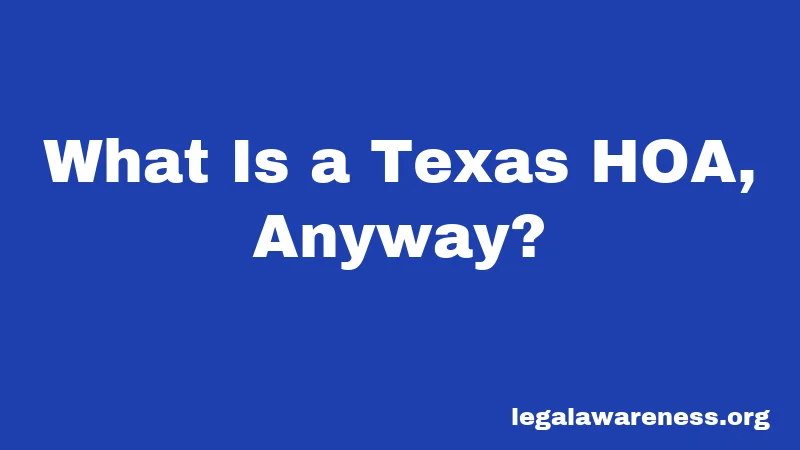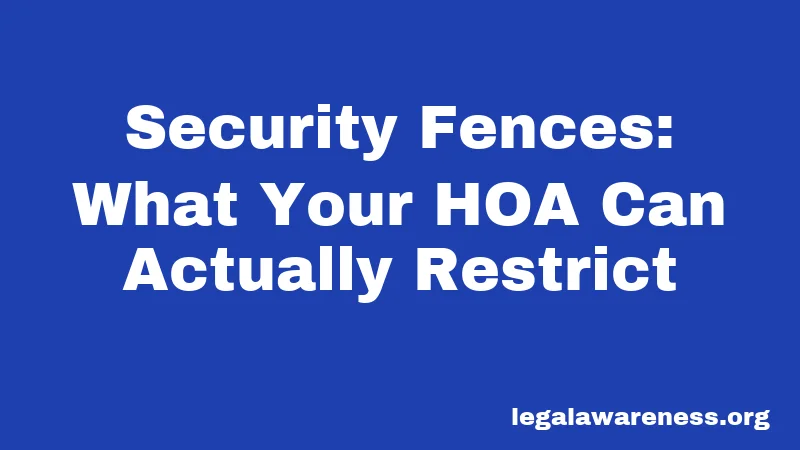Texas HOA Laws in 2026: What Just Changed (And Why It Matters)
Most Texas homeowners have no idea how much changed in their HOA rules just a few months ago. Seriously. Between September 2025 and now, new state laws completely rewrote how HOAs operate across Texas. Some changes protect you. Others shift what your HOA can and can’t do. Either way, knowing these rules is huge.
Here’s the thing: the 2025 Texas Legislature passed multiple bills that took effect September 1, 2025. If you live in an HOA community, these laws affect you directly. We’re talking about solar panels, political gatherings, lawn watering, and tons more. Let’s break down exactly what you need to know for 2026.
What Is a Texas HOA, Anyway?

A homeowners association (HOA) is basically a community organization that sets and enforces rules for neighborhoods. When you buy a house in an HOA community, you automatically become a member. You pay dues called assessments. In return, the HOA maintains common areas and enforces community standards.
Think of it like this. You own your house. But the HOA owns the rules. They can tell you what color your fence needs to be, when you can water your lawn, or how your yard should look. Pretty straightforward, right?
The Big Changes Coming in 2026
Okay, pause. Read this carefully. Texas just passed several major laws. Most of them started working September 1, 2025. By 2026, you need to understand them. Here’s where things get interesting.
Solar Panels and Roof Tiles Get New Protection
Your HOA can’t stop you from going green anymore. House Bill 431 says solar energy devices are protected. That now includes solar roof tiles, not just traditional panels.
What does this mean for you? If you want to install solar panels or solar roof tiles, your HOA has to allow it. They can’t ban it outright. They also can’t charge you insane fees just because it’s solar. This law took effect right away, which is unusual.
Let’s say you’ve been thinking about adding solar. Now’s actually a great time. Your HOA’s hands are tied. They have to approve your installation.
No Fines for Brown Lawns During Water Shortages
Here’s one homeowners will love. House Bill 517 protects you from HOA fines for brown grass. But only in specific situations.
When your city or water authority puts in place watering restrictions, your HOA can’t fine you for brown or dead-looking grass. Not during the restriction period. And here’s the kicker—they also can’t fine you for 60 days after restrictions end. Your lawn needs time to recover, and now the law says so.
Wondering if this applies to you? Check whether your area is under watering restrictions. If it is, your HOA can’t touch you for lawn color. Not legally, anyway.
This is huge for Texas homeowners. Drought happens. And now the law protects you from getting fined because of something you can’t control. Pretty smart, right?
Political Gatherings Get Protected
House Bill 621 basically says your HOA can’t stop you from hosting elected officials or political candidates in common areas. Your neighborhood isn’t a censorship zone anymore.
You can invite a city council member to speak. You can host a candidate forum in the clubhouse. The HOA can’t ban it. They can’t prevent it. That’s a major shift.
Now, the HOA can still make some rules. They can charge rental fees. They can set hours. They can limit occupancy. They can ask for a deposit. But they can’t say “no political events.” That’s the key difference.
This protection doesn’t apply to seasonal areas or spaces used only for internal meetings. But for main common areas? Political speech is now protected.
Electronic Voting and Meetings Are Now an Option
Senate Bill 2629 brings HOA voting into the digital age. Associations can now offer electronic voting, phone voting, and online meetings. Or they can stick with in-person gatherings. It’s their choice—but homeowners need at least one option.
Previously, the only options were proxy voting or absentee ballots. Now you can vote electronically. You can attend meetings by phone. You can participate online. This matters if you’re busy or if you travel.
Here’s the practical side: HOAs have to offer at least one voting method. Either electronic ballots, absentee ballots, or proxy voting. It’s flexibility that didn’t exist before.
How HOAs Are Getting More Transparent

Stay with me here. Some of the new rules are about HOA transparency. And honestly? They’re good for you.
Governing Documents Must Go Online
Senate Bill 711 changed something big. If your HOA has 60 or more units, or if it uses a professional management company, they now must post their governing documents online. We’re talking about bylaws, rules, budgets, and meeting minutes.
Not sure what counts as a violation? Your HOA’s documents should spell it out. And now those documents need to be available on a website you can access. No more hunting for answers.
This sounds simple, but it’s powerful. You can now look up rules without calling anyone. You can read the fine schedule. You can see exactly what the HOA has the authority to do.
Management Certificates Must Be Filed Properly
This one’s a bit technical, but stay with me. Management certificates are documents that HOAs file to prove they’re legitimate. If they’re filed wrong, the HOA loses certain powers.
Senate Bill 711 adds a new requirement. Management certificates must be filed with the Texas Real Estate Commission within seven days of being recorded. If an HOA doesn’t do this, it can’t collect attorney’s fees or interest on unpaid assessments.
What does this mean for you? It means your HOA has to get their paperwork right. If they don’t, their enforcement powers weaken. That’s actually a protection for you.
Architectural Reviews Got Stricter Rules
Wondering about getting approval for a fence, addition, or renovation? The rules changed here too.
Senate Bill 711 updated how HOAs handle architectural review. If your HOA has more than 40 lots, they now have to officially recruit committee members. It’s like a mini-election for the architectural review committee.
The HOA must give at least 10 days’ notice of open positions. Volunteers are preferred initially. This makes the process more transparent and fair than it used to be.
This matters because architectural committees have huge power. They approve or deny your renovation plans. Now their selection process is more open and fair. That’s progress.
Security Fences: What Your HOA Can Actually Restrict

Senate Bill 711 clarified something confusing. What security fences can HOAs actually prohibit?
Your HOA can restrict fencing that blocks a sidewalk used by the public. They can prohibit fencing in a drainage easement. They can restrict fencing in front areas of homes, but only with exceptions.
Here’s the important part. If you need security fencing for legitimate safety reasons, you can request permission. You just need documentation from law enforcement explaining the security need. Then your HOA can’t say no.
What about fencing installed before September 1, 2025? That’s grandfathered in. It stays. Also, if your address is exempt from public disclosure for safety reasons, fencing rules don’t apply the same way.
The takeaway? Your HOA can’t just ban all fencing in front yards anymore. Rules are way more specific now.
Resale Certificate Fees Hit a Hard Cap
This one affects anyone planning to sell their home. Resale certificates are documents that confirm an HOA has no outstanding liens against your property. Buyers need them. And they used to be expensive.
Senate Bill 711 capped the fee. Your HOA can charge maximum $375 for a resale certificate. Before this, some HOAs charged $600 or more.
Planning to sell in 2026? Great news. Your resale certificate costs just went way down. That’s money back in your pocket.
Tenant Information: What HOAs Can Actually Ask
Got a rental property in an HOA community? New rules protect your privacy.
HOAs can ask for basic tenant information. That’s the tenant’s name, contact information, and lease dates. That’s it. No credit reports. No background checks. No application forms.
This is actually huge. Some HOAs used to demand extensive tenant screening. Now they can’t. They get name, phone number, and lease dates. Period.
And here’s something important. While resale fees are capped at $375, leasing fees are not capped. Your HOA can charge whatever they want for tenant transfers. Just know the difference.
What Didn’t Make It Into Law
Not every proposal passed. Some things homeowners wanted didn’t happen.
A bill to allow backyard chickens didn’t make it. Three separate bills tried. None passed. Your HOA can still ban chickens if they want.
A proposal to cap assessment increases also failed. There’s no limit on how much your HOA can raise dues. That’s still totally up to them.
Also worth noting—a bill requiring HOAs to hold elections for board vacancies didn’t pass. Boards can still appoint members to fill empty seats.
Penalties: What Happens If Your HOA Breaks the Law
Breaking new rules has consequences for HOAs. And those consequences actually protect you.
If an HOA fails to file their management certificate with the Texas Real Estate Commission, they lose key enforcement powers. They can’t collect attorney’s fees. They can’t collect interest on unpaid assessments. That’s a serious penalty for the HOA.
HOAs that fail to file their rules with TREC can face daily penalties up to $1,000. After enough days, that adds up fast.
If an HOA violates the solar panel law, you can take legal action. If they fine you for brown grass during a watering restriction, that fine shouldn’t hold up.
The penalties aren’t usually against homeowners. They’re against HOAs. And that works in your favor.
How to Protect Yourself in 2026
Okay, here’s what you actually need to do.
First, get online and check your HOA’s website. Is it posted there? Are the governing documents available? If your HOA has 60+ units or a management company, these documents must be online now. If they’re not, that’s a problem worth addressing.
Second, keep your address current with your HOA. Notices are supposed to be sent by certified or verified mail. If they can’t reach you, that’s an issue.
Third, if your HOA sends you a notice about a violation, respond immediately. You have time to fix problems before fines kick in. But you need to act fast.
Fourth, read your fine schedule. Your HOA must post this in writing. Ask to see it. Know what violations cost. This transparency is new, and it’s your right.
Fifth, don’t pay an unfair resale certificate fee. The cap is $375. If someone quotes you more, push back. The law is clear.
Common Questions About Texas HOA Laws
Can my HOA still ban solar panels?
Nope. Not as of 2025. Solar panels and solar roof tiles are protected. Your HOA has to allow them. They can set reasonable rules about placement and appearance, but they can’t ban them outright.
What if my HOA is violating the new laws?
Document everything. Get the violation in writing if possible. Contact your HOA board or management company in writing. If they don’t fix it, consult a real estate attorney. Texas allows lawsuits against HOAs.
Do the new laws apply to condos or just regular HOAs?
Many apply to both. Senate Bill 711 affects condos especially hard with new filing and transparency requirements. Check your specific situation with your management company.
Can my HOA still enforce rules about lawn care?
Yes, but with limits. They can’t fine you for brown grass during a watering restriction or for 60 days after. Other lawn care rules—like maintenance and weeds—still apply. Just not color during restrictions.
Is my HOA required to have a website?
Only if they have 60 or more units or use a professional management company. If yours doesn’t meet that threshold, a website isn’t required by law.
Final Thoughts
Texas HOA laws just got way more homeowner-friendly in 2025. You’ve got protections for solar energy. You’ve got protections for lawns during droughts. You’ve got more transparency about rules. You’ve got protection for political speech.
But here’s the real deal. Knowing these laws is step one. Using them is step two. If your HOA isn’t following these rules, speak up. Attend meetings. Ask questions. Request documents. The law is on your side—but only if you know what to ask for.
Stay informed, stay safe, and when in doubt, reach out to your HOA or a real estate attorney. You’ve got this.

Thank you Thank you Thank you just in time for my problems
You are welcome. Please share this so others in similar situations can overcome these challenges.